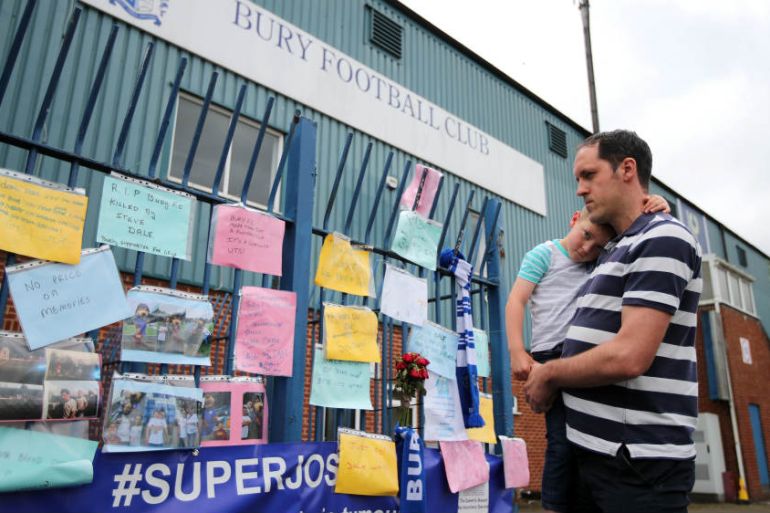Bury FC: The death of a club and a town in mourning
The story behind Al Jazeera’s exclusive report into what the death of one football club means to its community.

Bury, United Kingdom – We spent five days in Bury, and four words were used time and again by so many of the people we met.
“It’s like a death.”
Keep reading
list of 4 itemsGermany boss Nagelsmann ignores Hummels, sticks with regulars for Euro 2024
Record-breaking India captain Sunil Chhetri to quit international football
Manchester United pull level with Newcastle in European qualification chase
The town has lost its football club. But what seems initially like a great shame is so much more than that. This is not about football. It is about life.
Bury were once feared in English football – 134 years of history, twice winners of the famous FA Cup.
The club is only 15 kilometres (nine miles) from Manchester, and the giants of City and United. The North West of England is some of world football’s most fertile ground.
But football has become a business. The rich have become more powerful. The Premier League is the focus of football fans around the globe.
|
|
Clubs such as Bury have struggled to keep up. There are more than 20 football clubs here in the North West, and some have run into trouble. Bury went over the edge, and were expelled from the English Football League in August.
Their owner at time was Steve Dale, who bought the club for a single pound but was rarely seen at Gigg Lane, the home of Bury FC since 1885.
We visited the nearby Bolton Wanderers, a proud trophy-laden club with a similar 140 years of history behind them. They also nearly went out of business earlier this season.
But Bolton fans still have their match day. The sights, smells and sounds. The feeling of togetherness, the unexpected. The ritual and the history. Many families coming together as one big footballing tribe.
The day saw Bolton, up against Milton Keynes Dons, score the only goal of the game with time running out. The day saw fans bubbling with joy as they left the stadium. It made their day. The feeling will last beyond this weekend.
|
|
Down the road at Bury, it should have been match day. But the ground is deserted. The pitch maintained, but there are no players, no fans here.
“I miss the place with everything in my being at the moment,” Bury fan James Bentley tells me. We stand at his “lucky” turnstyle, number 23. He pulls out two books he has written on Bury FC teams. Also in the bag is his membership pass from coming here aged seven with his father. Cameraman Ben, producer Brian and myself exhale and try to take it in; it is deeply moving, and typical of our time in Bury.
“I do a five-day week, Monday to Friday, in an office – and previously you’d be sitting at your desk thinking ‘at least I’ve got the football to go to’. I don’t look forward to the weekend any more.”

Joy Hart encapsulates Bury. Her father, Les, was a player, physio, coach and manager over a period of 44 years. She handcuffed herself to the stadium when the English Football League (EFL) kicked them out of the league, and helped publicise their plight in the UK media.
She makes sure she meets us, and we hug. Her voice cracks with emotion as she explains the sense of loss.
“You have to be a football fan to understand that we’re mourning. If they are thinking of us they understand the death that we feel.”
But there remains a spirit, that, somehow, all is not quite lost.
The community work, so often unseen, continues. At least for now. We visit the under-17 boys’ football team in training. The early morning light over the fields is beautiful and poignant.
Across town we watch over-55s playing indoor walking football. There is funding from the Premier League and EFL, but only until next summer. It is something, but is it enough?
Why did the EFL not do more to save Bury? How did they allow Steve Dale to take charge in the first place? Al Jazeera asked these questions and a UK government enquiry in October demanded answers.
The EFL has said it will review its procedures. But it is too late for Bury FC.
The hope here is that in could become a “phoenix” club, playing somewhere down the leagues but still alive. We join three fans Helen, Simon and Jon as they explore the possibilities.
“We might not have a club at this moment in time.” says Jon. “But we will be Bury. We are Bury.”
He should know. Jon watched games with his father. His father watched games with Jon’s grandfather – who Jon never met.
Through Bury FC he feels closer to his father’s father.
This is what this story is about. It’s not about a goal, or a win, or a season, or a decade. It’s not even really about football. It’s about belonging to something, to somewhere.
I brought my Horsham FC scarf, from my hometown team in Sussex, to hang with the scarves and tributes at the deserted Gigg Lane ground.
As a football fan who cares about the role of clubs in their community, it felt the right thing to do.
Football fans everywhere feel for the fans of Bury, for the people of Bury. And we thank them for letting us into their lives. We are very grateful.
Which fans will be next to suffer? Trust me, Bury will not be the last.
Who owns your club? And what do they plan to do with it?
Part two of Lee’s special report from Bury airs on Al Jazeera at 10:40GMT on Christmas Day